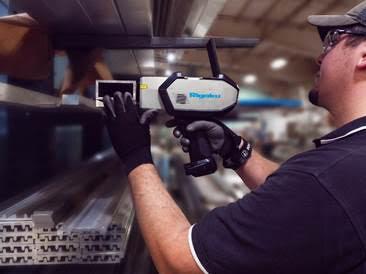
Rigaku Analytical Devices, a leading pioneer of handheld spectroscopic analyzers, has announced the launch of the KT-500 - a new, handheld laser-induced breakdown spectroscopy (LIBS) analyzer. The Rigaku KT-500 features the first carbon-capable, miniaturized, high resolution echelle spectrometer, known as HiRES Technology. It represents the next advancement in LIBS technology with the ability to provide identification of elements that were difficult to see with previous generation handheld LIBS analyzers, such as carbon. This capability gives the user the ability to analyze ferrous and non-ferrous alloys on one device, making it the single tool of choice for quality assurance in metal fabrication and positive materials identification (PMI) in mission-critical applications, such as in power generation, oil and gas and aerospace.
The handheld Rigaku KT-500 LIBS analyzer strengthens the capabilities of LIBS technology and provides the user with better analysis of low alloy steels, stainless steels, nickel and cobalt alloys, and now carbon steels. Because of this, the KT-500 is the solution for addressing all the most common alloy grades used in metal fabrication. Additionally, its carbon analysis, along with low detection limits for other key elements, makes it ideal for determining carbon equivalence as well as solving many of the key applications required in petrochemical facilities including sulfidation, corrosion and residual elements.
Designed specifically for use in industrial applications, the following features put the KT-500 in a class of its own:
- Lightweight with aluminum housing
- IP54 rating for protection against dusty environments
- Hot swappable batteries
- Carbon analysis in steels including carbon, low alloy and stainless steels.
- High performance analysis of stainless steels, nickel and cobalt alloys without purge gas consumption
- Multiple access user interface, facilitating single-handed operation, includes (flip-up touchscreen, oversized keypad, side quick keys)
- Integrated micro-camera
- WiFi for easy data transfer and report generation
- Access and download data without using third party software
- Optional front plate for analysis of welds
- Docking / charging station
Another major benefit to the user is that because the KT Series of handheld LIBS analyzers utilizes a laser excitation source. The KT-500 is safe for the user to analyze small components while holding in hand, as well as minimal to no regulatory licensing requirements.
“We recognized the need of the metals industry for a solution that provides fast, easy, and safe alloy analysis in a convenient platform,” said Jessica Feuer, Product Manager at Rigaku Analytical Devices. “Headaches from lugging OES machines around will be a thing of the past, as is needing another piece of equipment to analyze your other common alloy grades. Our award-winning, first generation handheld LIBS provided us with a good foundation to take this technology to the next level with the introduction of the KT-500.”
The Rigaku KT-500 will be available for demonstration and purchase initially in North America. Global distribution will be available later in the year.
Contact Details
Related Glossary Terms
- alloy steels
alloy steels
Steel containing specified quantities of alloying elements (other than carbon and the commonly accepted amounts of manganese, sulfur and phosphorus) added to cause changes in the metal’s mechanical and/or physical properties. Principal alloying elements are nickel, chromium, molybdenum and silicon. Some grades of alloy steels contain one or more of these elements: vanadium, boron, lead and copper.
- alloys
alloys
Substances having metallic properties and being composed of two or more chemical elements of which at least one is a metal.
- carbon steels
carbon steels
Known as unalloyed steels and plain carbon steels. Contains, in addition to iron and carbon, manganese, phosphorus and sulfur. Characterized as low carbon, medium carbon, high carbon and free machining.
- quality assurance ( quality control)
quality assurance ( quality control)
Terms denoting a formal program for monitoring product quality. The denotations are the same, but QC typically connotes a more traditional postmachining inspection system, while QA implies a more comprehensive approach, with emphasis on “total quality,” broad quality principles, statistical process control and other statistical methods.
- stainless steels
stainless steels
Stainless steels possess high strength, heat resistance, excellent workability and erosion resistance. Four general classes have been developed to cover a range of mechanical and physical properties for particular applications. The four classes are: the austenitic types of the chromium-nickel-manganese 200 series and the chromium-nickel 300 series; the martensitic types of the chromium, hardenable 400 series; the chromium, nonhardenable 400-series ferritic types; and the precipitation-hardening type of chromium-nickel alloys with additional elements that are hardenable by solution treating and aging.

